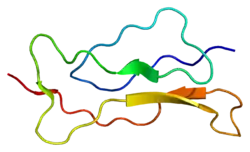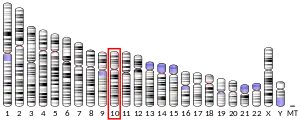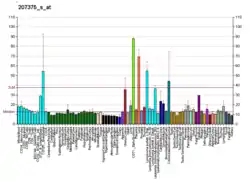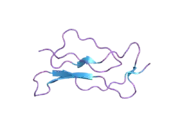Interleukin 15 receptor, alpha subunit
Interleukin 15 receptor, alpha subunit is a subunit of the interleukin 15 receptor that in humans is encoded by the IL15RA gene.[5]
Structure
The IL-15 receptor is composed of three subunits: IL-15R alpha, CD122, and CD132. Two of these subunits, CD122 and CD132, are shared with the receptor for IL-2, but IL-2 receptor has an additional subunit (CD25). The shared subunits contain the cytoplasmic motifs required for signal transduction, and this forms the basis of many overlapping biological activities of IL15 and IL2, although in vivo the two cytokines have separate biological effects. This may be due to effects of the respective alpha chains, which are unique to each receptor, the kinetics and affinity of cytokine-cytokine receptor binding, or due to the availability and concentration of each cytokine.
Function
IL-15Ralpha specifically binds IL15 with very high affinity,[6] and is capable of binding IL-15 independently of other subunits. It is suggested that this property allows IL-15 to be produced by one cell, endocytosed by another cell, and then presented to a third party cell.[7]
This receptor is reported to enhance cell proliferation and expression of apoptosis inhibitor BCL2L1/BCL2-XL and BCL2. Multiple alternatively spliced transcript variants of this gene have been reported. The full length sequences of only two variants encoding distinct isoforms are available.[5]
Isoforms
Several isoforms of the IL-15Ralpha protein have been detected. These isoforms can either result from alternative splicing of the mRNA encoding for the receptor or by shedding of the extra cellular domain of the receptor protein.
References
- GRCh38: Ensembl release 89: ENSG00000134470 - Ensembl, May 2017
- GRCm38: Ensembl release 89: ENSMUSG00000023206 - Ensembl, May 2017
- "Human PubMed Reference:". National Center for Biotechnology Information, U.S. National Library of Medicine.
- "Mouse PubMed Reference:". National Center for Biotechnology Information, U.S. National Library of Medicine.
- EntrezGene 3601
- Giri JG, Ahdieh M, Eisenman J, Shanebeck K, Grabstein K, Kumaki S, Namen A, Park LS, Cosman D, Anderson D (1994). "Utilization of the beta and gamma chains of the IL-2 receptor by the novel cytokine IL-15". EMBO J. 13 (12): 2822–30. doi:10.1002/j.1460-2075.1994.tb06576.x. PMC 395163. PMID 8026467.
- Dubois S, Mariner J, Waldmann TA, Tagaya Y (2002). "IL-15Ralpha recycles and presents IL-15 In trans to neighboring cells". Immunity. 17 (5): 537–47. doi:10.1016/s1074-7613(02)00429-6. PMID 12433361. (primary source)
Further reading
- Giri JG, Kumaki S, Ahdieh M, Friend DJ, Loomis A, Shanebeck K, DuBose R, Cosman D, Park LS, Anderson DM (1995). "Identification and cloning of a novel IL-15 binding protein that is structurally related to the alpha chain of the IL-2 receptor". EMBO J. 14 (15): 3654–63. doi:10.1002/j.1460-2075.1995.tb00035.x. PMC 394440. PMID 7641685.
- Jacob CO, Mykytyn K, Varcony T, Drabkin HA (1993). "Mapping of the interleukin 5 receptor gene to human chromosome 3 p25-p26 and to mouse chromosome 6 close to the Raf-1 locus with polymorphic tandem repeat sequences". Mamm. Genome. 4 (8): 435–9. doi:10.1007/BF00296817. PMID 8104057. S2CID 7862651.
- Anderson DM, Kumaki S, Ahdieh M, Bertles J, Tometsko M, Loomis A, Giri J, Copeland NG, Gilbert DJ, Jenkins NA (1995). "Functional characterization of the human interleukin-15 receptor alpha chain and close linkage of IL15RA and IL2RA genes". J. Biol. Chem. 270 (50): 29862–9. doi:10.1074/jbc.270.50.29862. PMID 8530383.
- Andersson B, Wentland MA, Ricafrente JY, Liu W, Gibbs RA (1996). "A "double adaptor" method for improved shotgun library construction". Anal. Biochem. 236 (1): 107–13. doi:10.1006/abio.1996.0138. PMID 8619474.
- Yu W, Andersson B, Worley KC, Muzny DM, Ding Y, Liu W, Ricafrente JY, Wentland MA, Lennon G, Gibbs RA (1997). "Large-scale concatenation cDNA sequencing". Genome Res. 7 (4): 353–8. doi:10.1101/gr.7.4.353. PMC 139146. PMID 9110174.
- Dubois S, Magrangeas F, Lehours P, Raher S, Bernard J, Boisteau O, Leroy S, Minvielle S, Godard A, Jacques Y (1999). "Natural splicing of exon 2 of human interleukin-15 receptor alpha-chain mRNA results in a shortened form with a distinct pattern of expression". J. Biol. Chem. 274 (38): 26978–84. doi:10.1074/jbc.274.38.26978. PMID 10480910.
- Pereno R, Giron-Michel J, Gaggero A, Cazes E, Meazza R, Monetti M, Monaco E, Mishal Z, Jasmin C, Indiveri F, Ferrini S, Azzarone B (2000). "IL-15/IL-15Ralpha intracellular trafficking in human melanoma cells and signal transduction through the IL-15Ralpha". Oncogene. 19 (45): 5153–62. doi:10.1038/sj.onc.1203873. PMID 11064452.
- Mariner JM, Lantz V, Waldmann TA, Azimi N (2001). "Human T cell lymphotropic virus type I Tax activates IL-15R alpha gene expression through an NF-kappa B site". J. Immunol. 166 (4): 2602–9. doi:10.4049/jimmunol.166.4.2602. PMID 11160322.
- Asao H, Okuyama C, Kumaki S, Ishii N, Tsuchiya S, Foster D, Sugamura K (2001). "Cutting edge: the common gamma-chain is an indispensable subunit of the IL-21 receptor complex". J. Immunol. 167 (1): 1–5. doi:10.4049/jimmunol.167.1.1. PMID 11418623.
- Wu TS, Lee JM, Lai YG, Hsu JC, Tsai CY, Lee YH, Liao NS (2002). "Reduced expression of Bcl-2 in CD8+ T cells deficient in the IL-15 receptor alpha-chain". J. Immunol. 168 (2): 705–12. doi:10.4049/jimmunol.168.2.705. PMID 11777964.
- Khan IA, Moretto M, Wei XQ, Williams M, Schwartzman JD, Liew FY (2002). "Treatment with soluble interleukin-15Ralpha exacerbates intracellular parasitic infection by blocking the development of memory CD8+ T cell response". J. Exp. Med. 195 (11): 1463–70. doi:10.1084/jem.20011915. PMC 2193543. PMID 12045244.
- Kurowska M, Rudnicka W, Maślińska D, Maśliński W (2002). "Expression of IL-15 and IL-15 receptor isoforms in select structures of human fetal brain". Ann. N. Y. Acad. Sci. 966 (1): 441–5. Bibcode:2002NYASA.966..441K. doi:10.1111/j.1749-6632.2002.tb04245.x. PMID 12114302. S2CID 35501431.
- Comes A, Di Carlo E, Musiani P, Rosso O, Meazza R, Chiodoni C, Colombo MP, Ferrini S (2002). "IFN-gamma-independent synergistic effects of IL-12 and IL-15 induce anti-tumor immune responses in syngeneic mice". Eur. J. Immunol. 32 (7): 1914–23. doi:10.1002/1521-4141(200207)32:7<1914::AID-IMMU1914>3.0.CO;2-P. PMID 12115611.
- Bernard J, Harb C, Mortier E, Quéméner A, Meloen RH, Vermot-Desroches C, Wijdeness J, van Dijken P, Grötzinger J, Slootstra JW, Plet A, Jacques Y (2004). "Identification of an interleukin-15alpha receptor-binding site on human interleukin-15". J. Biol. Chem. 279 (23): 24313–22. doi:10.1074/jbc.M312458200. PMID 15039446.
- Vámosi G, Bodnár A, Vereb G, Jenei A, Goldman CK, Langowski J, Tóth K, Mátyus L, Szöllösi J, Waldmann TA, Damjanovich S (2004). "IL-2 and IL-15 receptor alpha-subunits are coexpressed in a supramolecular receptor cluster in lipid rafts of T cells". Proc. Natl. Acad. Sci. U.S.A. 101 (30): 11082–7. Bibcode:2004PNAS..10111082V. doi:10.1073/pnas.0403916101. PMC 503744. PMID 15263076.
- Mortier E, Bernard J, Plet A, Jacques Y (2004). "Natural, proteolytic release of a soluble form of human IL-15 receptor alpha-chain that behaves as a specific, high affinity IL-15 antagonist". J. Immunol. 173 (3): 1681–8. doi:10.4049/jimmunol.173.3.1681. PMID 15265897.







